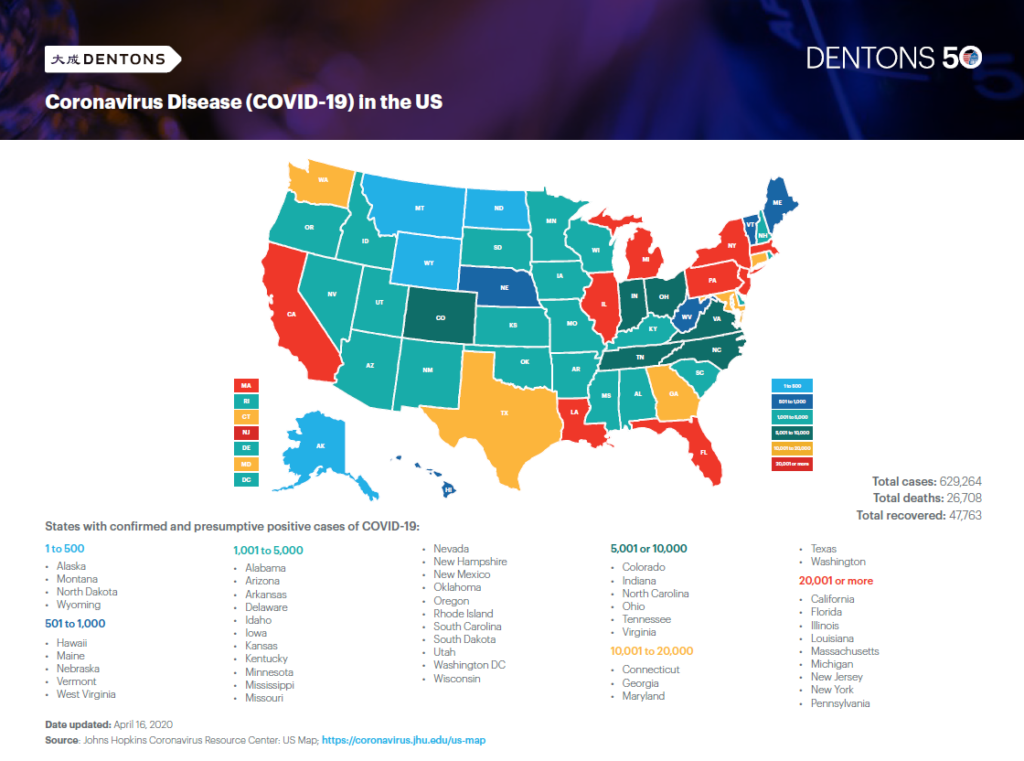
Arkansas
As of April 16th
Active COVID-19 Cases:
- Total Confirmed 4/14: 1498
- New since 4/14: +71
Total Confirmed Positive to Date: 1569
- Total Deaths 4/14: 32
- New since 4/14: +1
Total Deaths to Date: 33
GENERAL INFORMATION:
- AR COUNTIES (75) WITH CONFIRMED CASES: 70
MORE PAY FOR HEALTHCARE WORKERS
- Waiver approved to temporarily increase the weekly income of direct care workers (including enhanced payments for those working with COVID19 positive patients) in long term care facilities and settings.
- CARES Act Steering Committee is being asked to increase the pay for direct care workers in hospitals ; and non-direct care workers in hospitals and long term care facilities and settings.
- NURSING HOME CONFIRMED CASES
- Number of Locations: 28
- Nursing Home Residents: 98
- Nursing Home Workers: 88
- Number of deaths: 7
- HOSPITALIZED: 83 WITH VENTILATOR: 26
- HEALTHCARE WORKERS: 215
Georgia
As of April 16th
Daily State Public Health stats: State cases are up to 15,454 at 9 a.m. this morning. Georgia is up to 584 deaths., with 3,040 hospitalized patients.
- IHME predicts that Georgia will now peak on May 1 with 91 deaths on May 3. IHME predicts a shortage of 218 ICU beds and 715 ventilators [both numbers less than before].
- The workforce at Plant Vogtle nuclear plant will be cut 20 percent due to COVID-19.
- Rev. Warnock raised more the last quarter (US$1.5 million) than Loeffler and Collins, but Loeffler can self-fund. In the other Senate race, Perdue raised US$1.6 million and has US$9 million on hand. Ossoff led the Democratic field with US$1 million in new funds.
- In the 6th District, McBath has US$2.6 million in hand with Handel reporting almost US$1 million.
- Georgia’s unemployment trust fund could be exhausted in 10 weeks. GDOL processed 390,132 claims between March 29 and April 4, more than three times what was processed the week before.
- More than 395,000 Georgians have already requested absentee ballots so far for the June 9 primary.
Kansas
As of April 16th
Governor Kelly issued another Executive Order. The Order brings Kansas adult-care homes in line with other occupational licensing exemptions the Governor has issued in recent days. A press release on the Order, issued this morning, can be found here.
State Finance Council Meeting
Members of the Finance Council are as follows:
- The Governor
- The President of the Senate
- The Speaker of the House
- The Senate Majority Leader
- The Senate Minority Leader
- The Chair of the Senate Ways & Means Committee
- The House Majority Leader
- The House Minority Leader
- The Chair of the House Appropriations Committee
The State Finance Council met to discuss the following items:
Discussion of Emergency Funding Request for Hospitals by the Kansas Hospital Association
- Adam Proffitt, State Medicaid Director, addressed the Council.
- KHA is requesting emergency funding. Request is for about US$17.3 million.
- The request is to help Kansas Hospitals with the cashflow issues they are having now until federal funding comes in.
- Hospitals are in “dire conditions” as it relates to cash-on-hand.
- One of the driving courses is that hospitals have cancelled their elective outpatient procedures. Even if hospitals are not receiving a surge of COVID patients, they are preparing for a surge and have gotten rid of their elective procedures.
- Some hospitals are seeing a shift towards the in-patient side. This is common in hospitals located in metro areas. However, this is not enough to offset the funds that are being lost on the other side.
- Hospitals are typically not able to qualify for SBA loans. Government loan and quasi-government owned hospitals are an example. There seems to be a lot of money for hospitals, but that is not clear. So, again, this would be a “shot in the arm” from the state.
- The US$17.3 million would be all SGF. There is no way to match this with federal dollars. Breakdown:
- CAH – US$100,000 each
- Rural Hospitals – US$150,000 each
- Urban Hospitals – US$250,000 each
- This US$17.3 million would come from the increased FMAP funds given in the first stimulus package.
- Kansas received US$55 million (unreconciled). This would free up some funds that would otherwise be used for caseloads. These funds would be used for this bridge-funding.
- The thought is to have each of the hospitals submit a very simple application. The hospital could make a payment up to the cap mentioned earlier. This puts the responsibility on the hospital. If there is 85-95 percent of the hospitals who have a need, there will be a blanket payment made by hospital type. The funding would be appropriated to the agency, who would distribute the funds.
- Questions
- Governor Kelly asked if this information were to be requested on a grant application, would there be anything useful they would gain by having this information going forward. Mr. Proffitt said this would be roughly an academic exercise that would highlight need.
- Governor Kelly asked when federal funds come in, will hospitals need to apply for those as well? Mr. Proffitt said he assumes that is the case.
- Sen. Denning asked if it was possible to go into Q1 Medicaid charges and increase those to use the Federal FMAP? He said he is struggling with the fact that we cannot use those Q1 FMAP retroactive funds because it would almost be double the amount. Mr. Proffitt said that they have looked into that. This approach is good because it is immediate, but it is bad because you cannot match the funds.
- Sen. Denning said he knows there is a need, but for a big hospital this amount would only be a few hours of operating cashflow. Gov. Kelly said she shared the Senator’s concern, but this was “something” because it would take time to get federal funds out to the hospitals. She would explore the retroactive idea, but if it only means a few days in March, it may not make sense.
- Rep. Hawkins noted that there were lots of healthcare industries hurting. The best thing people could do was to get people back to work. Gov. Kelly agrees and said her office is working on a plan to help other physicians, dentists, etc. She noted that the state has bought 3D printers from dentists to build swabs for advanced testing. She has also been in contact with Governors from Colorado and Missouri to see how the regional economies can open again. However, life will not be normal for awhile until there is a vaccine.
- Rep. Ryckman asked about the new stay-at-home order that was issued today to extend the order to May 3. He asked where the legal authority was for this new order. Will Lawrence, Governor’s Chief of Staff, noted that the resolution continues to be in effect. They are looking to see whether a request like this needs to be put on a Finance Council agenda, but they are still looking at options. Rep. Ryckman asked why the order was issued when there wasn’t any legal authority. The Governor’s chief council, Clay Britton, then spoke. He noted that all EOs will expire either on a date certain, or whenever the Emergency Declaration is terminated, whichever is earlier.
- The Governor noted there was no vote needed and noted that a discussion occurred.
Request of the Adjutant General’s Department for disaster relief funding relating to the COVID-19 pandemic efforts.
- Major General David Weishaar addressed the Council
- The TAG requested an additional US$10 million.
- The original request was matched x3 by the federal government. They have spent US$50 of the US$65 million. They are spending US$2.2 million per day. The baulk of this spending is on PPE.
- This new funding would also be matched by the federal government.
- Questions
- Sen. McGinn asked for a breakdown of the PPE purchases. The General noted that every possible vendor is being contacted to buy PPE. The state is not relying on the federal government.
- Sen. McGinn asked what the current inventory of PPE was. The General noted that he would provide the Senator that information. He noted that she would be surprised of the order made and the amount received. Counties are not solely relying on the state. There are no counties that are out of everything – they know their burn rates.
- Rep. Ryckman noted that lead council last weekend said that the Legislature was in Session, while he feels they are out of Session. This has legal impact on the current decision. The Governor’s Counsel noted that under statute, the Finance Council can only take certain actions while the Legislature is not in Session. The Governor’s office believes the Legislature is not in Session.
- A roll call vote was taken on this measure. Motion made by Rep. Sawyer, seconded by Sen. McGinn.
- Wagle – Yes
- Denning – Yes
- Hensley – Yes
- McGinn – Yes
- Ryckman – Yes
- Hawkins – Yes
- Sawyer – Yes
- Waymaster – Yes
- Kelly – Yes
- Motion passes.
North Carolina
As of April 16th
- Laboratory confirmed Coronavirus cases: 5,123
- Coronavirus deaths: 117
- Currently hospitalized: 431
- Completed tests: 67,827
- NC Counties affected: 93/100
- Realtime COVID-19 Data for NC
Governor Cooper issued Executive Order 132 on Monday which temporarily suspends various motor vehicle regulations to ensure the restoration of utility services in cases of severe weather.
Mid-Week Update
On Monday, Gov. Roy Cooper reiterated the importance of North Carolina’s stay-at-home order as a way to slow the spread of the coronavirus. The governor said epidemiologists are modeling the spread of the virus in the state and those models show the executive orders are working, as the spread of the virus is accelerating, but at a much slower pace due to social distancing rules. Critics have urged the Governor to loosen the restrictions that have caused many businesses to shut down during the pandemic. Cooper said he wants people to continue to stay at home through April. He also said, however, that he’s working on eventually loosening restrictions but that that would need to be done in a way that will balance boosting the economy without overwhelming hospitals.
Cooper said what happens in the next two weeks will determine what executive orders and restrictions may be needed in May. He did not say if he would extend the stay-at-home order. “Some people want us to completely obliterate these restrictions,” Cooper said. “It would be a catastrophe.” The governor said he knows that staying at home is not sustainable in the long run, but people really need to stay at home as much as possible over the next two weeks. Cooper said he knows North Carolina’s economy needs to be jump-started, and the better the state can do the rest of April to flatten the curve, then “we can ease restrictions in May.”
After seeing the number of North Carolinians hospitalized due to coronavirus drop each of the previous two days, that number rose on Tuesday. DHHS Secretary Mandy Cohen said in a Tuesday afternoon news conference that the increase in hospitalizations is likely a combination of the increased severity in cases and increased reporting from hospitals. Cohen emphasized that the state is watching trends involving cases, hospitalizations and deaths and that the “doubling rate” for lab-documented cases is key. Cohen also stated that, in spite of Tuesday’s increase, the doubling rate is extending – meaning that the rate of acceleration is slowing, which shows that staying at home is working.
North Carolina prison officials announced that they have begun releasing some inmates early — an “extraordinary measure” designed to reduce the prison population and stem the spread of COVID-19. Under state law, the state Department of Public Safety has the authority to let certain inmates serve their sentences outside of a prison, provided they are supervised by community corrections officers. DPS said that none of the offenders being considered under that program have been convicted of a violent crime, and that all are scheduled to be released this year. Among the roughly 500 inmates that DPS said it is considering for early release:
- Pregnant inmates.
- Offenders age 65 and older with underlying health conditions
- Female inmates age 50 and older with health conditions and a release date in 2020
- Offenders age 65 and older with a release date in 2020
- Offenders already on home leave with a release date in 2020
- Offenders on work release with a release date in 2020
In a separate effort to reduce the prison population, DPS has been awarding time credits so that some inmates can be released ahead of schedule. In March, more than 300 offenders originally scheduled for release in April, May or June, were released under that program. Those offenders completed their minimum sentences and are now under post-release supervision. Since January of this year, more than 6,900 state inmates have been released from prison — an increase of 10 percent over the same period in 2019. The state’s prisons now house about 35,000 inmates. The North Carolina Post-Release Supervision and Parole Commission is also reviewing offenders under its authority for possible release. Over the past week, the commission has released more than a dozen pregnant women to community supervision.
The North Carolina General Assembly began to live stream remote committee meetings this week. The House is expanding its remote meeting capability ahead of its legislative session scheduled later this month. Viewers can watch the State House Select Committee on COVID-19 via YouTube and audio of the meetings will continue to be streamed on the General Assembly website.
Legislators are considering a list of laws and regulations to temporarily change in response to the coronavirus crisis, from absentee ballot requirements to open meetings laws to permit fees. The House COVID-19 committee’s government operations working group on Tuesday reviewed a five-page list of law changes requested by state agencies and other groups to address the unique circumstances of social distancing. The Committee chairs edited the list down from the original submissions, so the list discussed Tuesday included only a few of the State Board of Elections’ recommendations for a pandemic election. The list does include allowing absentee ballot request forms to be emailed or faxed instead of requiring mail or drop-off submissions. The committee is also looking to relax open meetings laws to make it easier for local governments to meet remotely through video conferencing. Many county commissions and town councils have already made the switch, but the current law is unclear on what actions they can legally take without a quorum physically present at a meeting site. One such issue involves quasi-judicial hearings, in which members of the public give factual testimony after being sworn in. The Committee chairs said it should apply only to the COVID-19 emergency period, but if successful, it may be something the General Assembly wishes to apply for future emergencies.
The proposals discussed Tuesday also include giving the Division of Motor Vehicles commissioner more power to extend deadlines and expiration dates for things like vehicle inspections and driver’s license renewals — something legislative leaders recently said they support. The list includes various changes to notary requirements to limit physical contact required for documents that typically must be notarized. There is also a broad proposal that would allow various state agencies to provide extensions on permits, fines, fees and other regulatory matters (see list below).
NC House legislators unveiled a draft bill (see below) Tuesday that would add US$25 million to a “bridge loan” program to help small businesses stay afloat until more federal aid arrives. That figure is lower than the US$100 million addition to the Golden LEAF Foundation’s loan that Sen. Jay Chaudhuri, D-Wake, proposed last week, but House Speaker Tim Moore said legislators could increase the amount. He told a House committee that the program could become more robust depending on how much money is available when the legislature returns at the end of the month. The structure of the state-funded effort is similar to the US$15 million program that Golden LEAF is already running with separate funding. Loans would be limited to businesses that have 50 or fewer employees and they would be interest-free if repaid within six months. Businesses would be required to repay their loans when/if they get federal assistance.
A new study based at Wake Forest Baptist Health will mail coronavirus antibody tests to 1,000 North Carolinians. Senate President Pro Tem Phil Berger has been calling for random sample testing to better gauge the extent of the outbreak and now the legislature will allocate US$100,000 to purchase the initial round of 1,000 kits and kickstart the study. Drs. John Sanders and David Herrington will lead the study at Wake Forest Baptist, in collaboration with doctors Michael Runyon and Michael Gibbs at Atrium Health. Dr. John Ioannidis, a Stanford University scientist frequently quoted on the need for random COVID-19 testing, is also a collaborator. The test kits will come from Scanwell Health, a Los Angeles-based digital health company. The test is not yet FDA-approved but is permitted for research studies. Scanwell has priced the kits at US$70 apiece, including shipping, materials, labor and an online consultation with a doctor or nurse practitioner. Some kits went into the mail Monday – the early participants were identified through Wake Forest Baptist’s patient platform. The data from the study will be combined with “near-real-time syndromic surveillance” through a platform developed by Oracle and is intended to help identify virus hot-spots. The researchers have applied for federal grants to continue to fund the study and potentially expand it to other states.
Pro Tem Berger and other proponents of random sampling hope the tests will provide a broader understanding of the virus’ hospitalization and fatality rates as North Carolina looks toward reopening its economy, or at least parts of it. Berger’s office said that, without data, compliance with stay-at-home orders will fall. If testing shows things are “as bad or worse than projected, then this data will instill confidence in government decisions and increase compliance,” Berger’s office said. If it shows things are better, “then we can have confidence that unwinding the economic shutdown can be done safely.”
As of Monday, more than US$5.7 billion dollars had already been approved for thousands of small businesses across North Carolina through the U.S. Small Business Administration’s Paycheck Protection Program. In all, 23,786 loans had been approved in the state totaling nearly US$5.73 billion. That is, North Carolina small businesses have received about 2.3 percent of the total number of loans and more than 2.3 percent of the total loan amount. Only 17 states – California, Colorado, Florida, Georgia, Illinois, Indiana, Massachusetts, Michigan, Minnesota, Missouri, New York, New Jersey, Ohio, Pennsylvania, Texas, Virginia and Wisconsin – received higher loan dollar amounts than North Carolina. As Congress moves toward potentially putting more money into the program, which started with US$349 billion, the current funds could run out as early as Wednesday.
Executive Actions, Week of April 13th
Legislative Actions, Week of April 6th
- List of Items Impacting Governmental Operations/Potential Legislation
- Draft Bill, Small Business Emergency Loans
North Carolina Agencies/Programs
- Agriculture
- Attorney General
- Price gouging complaint form
- Board of Funeral Service
- Community Colleges
- Courts
- Elections
- Health and Human Services
- Application for emergency childcare financial assistance
- Housing Finance Agency
- Human Resources
- North Carolina Association of County Commissioners
- Parks
- Public Assistance Grants (Dept. of Public Safety)
- Public Instruction
- Remote learning resources
- Revenue
- Application to be considered an “essential business”
- Taxpayer penalty relief
- Small Business Resource Portal (NC Chamber)
- Transportation
- UNC School of Government
- Local government issues
- UNC System
- Unemployment Insurance
- Utilities Commission
- Wildlife Resources Commission
Local Government Actions
- Pitt County Stay at Home Order, March 23
- Graham County and Municipalities Non-Resident Access Permit & Curfew, March 23
- Town of Beaufort Stay at Home Order, March 23
- Brunswick County State of Emergency, March 24
- Columbus County State of Emergency, March 24
- Mecklenburg County and Municipalities Stay at Home Order, March 24
- City of Durham Stay at Home Order, March 25
- Greensboro, Guilford County, High Point Stay at Home Order, March 25
- Buncombe County Stay at Home Order, March 26
- Cabarrus County and Municipalities Stay at Home Order, March 26
- Gaston County and Municipalities Stay at Home Order, March 26
- Haywood County Stay at Home Order, March 26
- Wake County and Municipalities Stay at Home Order, March 26
- City of Winston-Salem Stay at Home Order, March 26
- Village of Clemmons Shelter in Place Order, March 26
- City of Lexington Stay at Home Order and Curfew, March 27
- Madison County and Municipalities Stay at Home Order, March 27
- Rutherford County and Municipalities Stay at Home Order, March 27
- New Hanover County State of Emergency, March 28
- Watauga County and Municipalities State of Emergency, March 30
- City of Fayetteville State of Emergency and Curfew, March 31st
- Henderson County and Municipalities Stay at Home Order, March 31
Relevant Articles
- Cooper Says “Wholesale Lifting” of NC Coronavirus-Related Orders Would Be Catastrophic
- NC Legislature Will Fund Random COVID-19 Tests
- Democratic Governors Form Compacts to Coordinate Reopenings
- The Coronavirus Class Divide: Space and Privacy
- There’s Nothing Normal About Learning at Home: How Coronavirus School Closures Could Cause “Historic Academic Regression”
- Pandemic Ripple Effect Potentially Devastating for Western NC Farmers
Wisconsin
As of April 16th
This update can also be found here.
Senate Passes and Governor Evers signs AB 1038, Wisconsin’s COVID-19 Response Bill
Today the Wisconsin State Senate met virtually to pass Assembly Bill 1038, Wisconsin’s COVID-19 response bill. Unlike the Assembly where nearly half of the members were in the Assembly Chamber, but socially distanced, only Senate President Roger Roth (R-Appleton) and Senate Minority Leader Jennifer Shilling were physically in the same Committee hearing room where the Senate Session was orchestrated from. The rest of the 31 members of the State Senate joined either from their homes or their capitol offices. A rebroadcast of the session can be found here on WisconsinEye.
Similar to the action in the State Assembly, Senate Democrats offered amendments to the bill that were tabled on party-line 19-14 votes:
- Senate Substitute Amendment 1; which would have subbed the Assembly bill for the US$1.1 billion in General Purpose Revenue spending legislation Governor Tony Evers proposed. (Link to LFB Memo)
- Senate Amendments 1 and 2; which modify election procedures in Wisconsin and extend the deadlines in the legislation to last for the duration of the declared public health emergency. (Link to LFB Memo)
Although the session was brief like the State Assembly, unlike the State Assembly there was a little more discussion and friction in the State Senate, especially from Senate Democrats who thought the legislation did not go far enough.
Following the debate, the legislation passed 32-0, with State Senator Lena Taylor (D-Milwaukee) not recording a vote. Sen. Taylor released a statement criticizing her inability to speak during the debate and the incompleteness of the response in the legislation.
Upon passage, Senate Majority Leader Scott Fitzgerald released the following statement:
“We put this bill together as a reaction to the legislation recently passed by Congress. It combined aspects from the governor’s proposal with input from both parties of the Legislature. This legislation is important to the history of our state as we came together to respond to the crisis created by COVID-19.
“This bill puts working men, women, and families of our state first, by extending a lifeline to the recently unemployed. It also provides the Joint Finance Committee flexibility to timely respond to this pandemic and the problems it has created.
“We have to get businesses and the economy moving again, and I’m hopeful that this bill marks the first step in that direction. Those revenue streams support our schools, our social safety net, and our infrastructure.”
Joint Finance Committee Co-Chair Senator Alberta Darling (R-River Hills) released the following statement:
“The COVID-19 pandemic isn’t just a health crisis, it’s an economic crisis for our state. People are sick, many are without jobs, and businesses are struggling right now.
This bill makes sure people get the help they need as quickly as possible. It cuts red tape which allows the administration to act quickly to respond to the needs of our constituents.
I’m proud to support this bill because it’s more than bi-partisan. The ideas in this legislation came from Republicans, Democrats, and experts affected by the pandemic and the shutdown. It is truly a Wisconsin-made solution to the crisis we all face.
What our state needs now is to hear what plan Governor Evers has to restart our economy in a safe way and get people back to work.”
Senate Minority Leader Jennifer Shilling (D-La Crosse) released the following statement:
“This public health crisis is stressful for families and is impacting every facet of our lives,” said Senate Democratic Leader Jennifer Shilling (D-La Crosse).
“While this legislation is a starting point and a step in the right direction, there is still more work that needs to be done. Action should have been taken weeks ago and this is by no means the only support the legislature can offer. It is time the legislature come to grips with the severity of this virus and help the businesses, families and communities with the long-term ripple effects that COVID-19 will have on our state. Democrats and Gov. Evers want to focus on a comprehensive approach to the health, economic and workforce challenges facing our state. Wisconsinites are resilient, and together we will get through this and move forward.”
Immediately upon passage of the legislation, Governor Tony Evers called for the legislation and signed it into law
“My pen has been waiting for weeks to sign legislation that guarantees Wisconsin will capture our fair share of federal dollars under the CARES Act and ensures workers experiencing unemployment and underemployment won’t be forced to wait an extra week for needed benefits to kick in. This bill is finally a step in the right direction, but there is much more work to be done.
“Although I remain concerned about what is missing from this legislation I have called for this bill to be sent over for my signature as soon as possible. The bill I will sign falls short of what is needed to address the magnitude and gravity of what our state is facing, but I am not willing to delay our state’s response to this crisis.
“This bill does not provide hazard pay or workers compensation for all frontline and critical workers like first responders, childcare providers, and healthcare workers who are risking their lives going to work every day. This bill lacks meaningful support for small businesses and farmers who are struggling to make ends meet and includes no additional investments in our businesses or farmers through WEDC’s successful 20/20 program.
“Our state is facing significant challenges as we respond to and prevent the spread of COVID19. The bottom line is that we have to do everything we can to keep our families, our neighbors, and our communities safe while also looking towards our economic recovery. People across our state are hurting. We have asked Wisconsinites to make sacrifices so we can keep them safe, and the Legislature needs to do their part.
“My administration has been working to do as much as we can to respond to COVID-19 but we need to have the flexibility and resources to be able to provide necessary support for the people of our state. It’s clear that more legislation will be needed to meaningfully address COVID-19 in Wisconsin and help workers, families, businesses, and farmers.”
Legislative documents related to AB 1038:
- Legislative Fiscal Bureau Memo on the Bill
- Legislative Fiscal Bureau Memo on the Amendment that was adopted by Assembly and concurred by Senate
- Legislative Council Memo on the Amendment that was adopted by Assembly and concurred by Senate
Updated numbers released on Wednesday:
Of note over the weekend are the following new numbers (as of latest 4/12/2020 postings):
- 39,326 negative tests
- +1,329 over reported on Tuesday
- 3,721 confirmed cases
- +166 over reported on Tuesday
- 182 deaths
- +12 over reported on Tuesday
- 406 Hospital Admissions (162 patients in ICU)
- Hospital admissions are -35 compared to those reported on Tuesday (+1 ICU patients)
Sources:
Wisconsin Hospital Association (WHA) COVID-19 Situational Awareness Update site
DHS COVID-19: County Data; https://www.dhs.wisconsin.gov/covid-19/county.htm
Daily Numbers:
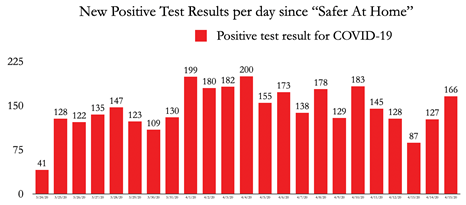
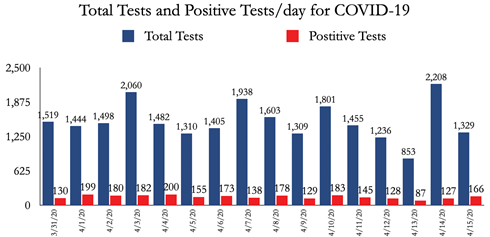
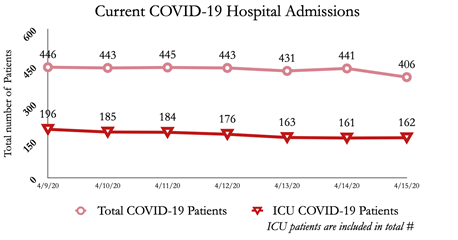
Cumulative Numbers:
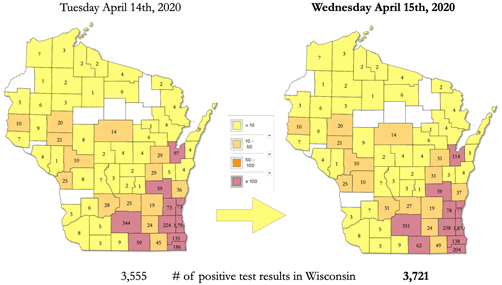
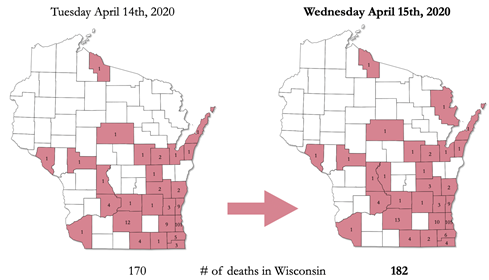
Here is a comprehensive list of State of Wisconsin resources related to the public health emergency (LINK)

